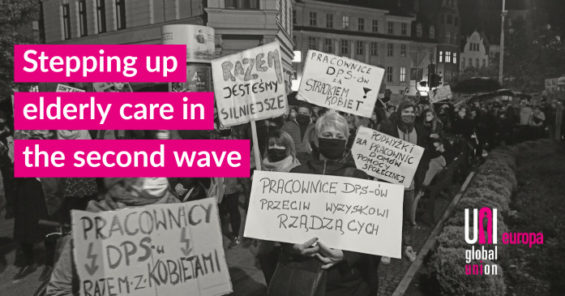
As part of the Involve project, COZZ (Central European Organizing Center) focuses on the lives and work of caregivers in polish nursing homes and private care centers. The following interview is an attempt to provide a first description of the struggles and problems of this group. In keeping with the idea of collective knowledge creation that is so important in the Involve project, we will give the floor to a colleague from our organization, an experienced person in the public nursing home sector – Anna, a union organizer.
What are the main problems of care workers in nursing homes?
The biggest problem is the lack of staff. And this is basically a subjective assessment of the workers, because the employers claim that they meet all the legal requirements for the number of staff employed, while this is not reflected in the actual number of staff. This is because, for example, many people are on sick leave or on vacation, and there are simply not enough of them. It may also be that some staff members have included assisting residents in their job description. And then the facility meets the requirements of the law, while in reality these people are not providing care and this work is done vastly by caregivers.
Part of this problem is also the fact that staff members that have in their job description added help with assisting workers should be obliged only to perform this task ad hoc, from time to time and in case of maids it has become a standard that they are helping often in assisting residents though its not their main job and competence. Even though number of staff is not enough to provide a proper care.
The second problem, which is very, very important, is that the workers, especially the caregivers and maids, are paid within the limits of the country’s minimum wage (about 600 euros net). This means that these workers feel hurt, so to speak, because a new person who comes to work gets exactly the same rate as people who have been working for 20 years. The only supplement to their salary is a seniority bonus, possibly a night bonus. And that’s the problem.
The third problem is that there is a kind of feudal system in nursing homes. This is the perception that the manager has power over people, that he/she doesn’t treat them as people with the dignity that these people deserve, but he/she treats them as his slaves and standing with a whip he/she yells at them. It happens that employees are verbally abused, so I would say it’s quite a broad spectrum of mobbing.
How do the workers try to change this situation, to fight for better working conditions?
The workers deal with it as best they can. If they don’t have a union in their workplace, well, they try to go and write some kind of complaint, or they organize themselves internally without a union and say, “No! We’ve had enough!” and they write a request to the director.
Or they go to the local government… And there, in that government, they unfortunately fail. And they lose in this fight, because the local official returns them back to the principal as the primary employee with whom they are supposed to have a social dialogue. The girls then do nothing.
On the other hand, when they are already very determined and set up some informal group or even formal – already unionized. And then they have a lot of tools to use, which come out of the Law on Trade Unions, and they cope just by starting to learn it. But it requires them to do additional work. They need a lot of energy to switch from “I must” to “I need” mode, and then they begin to realize these needs of theirs in the form of disagreement with what’s going on. Very often they have the problem that they are afraid to do it, well, because they are under strong power. As I said before – they are under the strong authority of a manager or director who does not allow them to realize their rights given by the law.
Marcin Marszałek, Researcher COZZ
